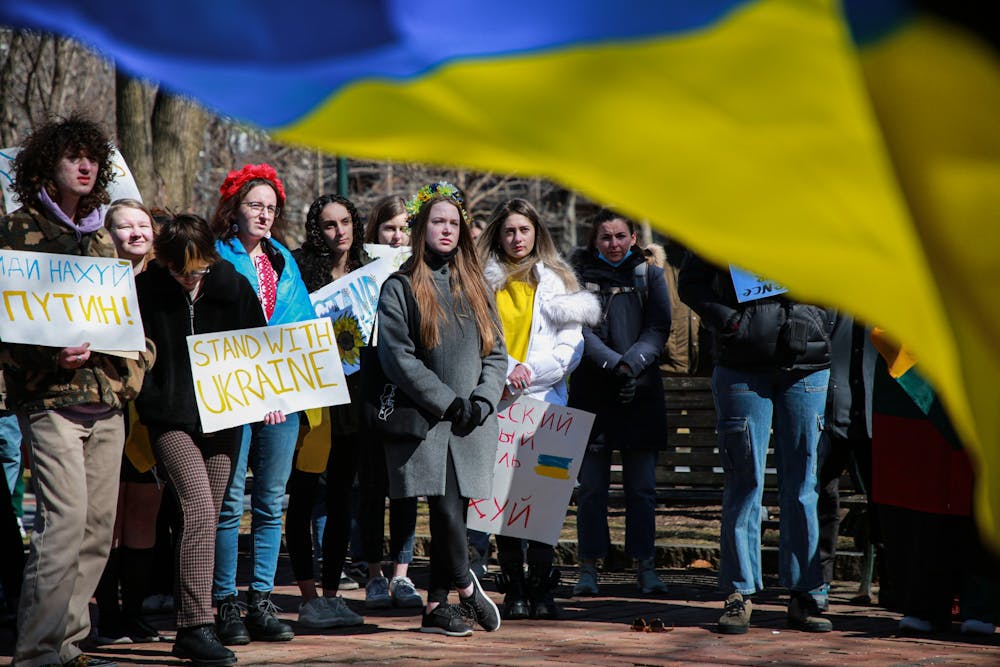
Policy experts scrutinized the potential worldwide consequences of Russia's recent invasion of Ukraine in a Perry World House briefing event held at 4 p.m. on March 2.
Nearly 200 individuals gathered Wednesday — virtually and in person — to listen to the panelists address Russian President Vladimir Putin’s decision to invade Ukraine last week, the U.S. government's response to the crisis, and how other nations will likely respond. Roughly 50 individuals attended in-person and another 150 listened in on Zoom.
Panelists included former Deputy Secretary General of NATO Alexander Vershbow, The Philadelphia Inquirer's Worldview columnist Trudy Rubin, and Penn professor of political science Rudra Sil. Jane Vaynman, an assistant professor of political science at Temple University, moderated the event.
Vaynman began the discussion by saying that human devastation occurring in Ukraine is not being ignored.
“This is a highly frightening and anxious moment for many of us, especially for those of us with family in the region. It is for me as well, I was born in Ukraine,” Vaynman said. “As we discuss this today, we understand this is a very real tragedy that’s unfolding.”
Vershbow contextualized the underlying causes of the war, stating that Russian leadership does not accept Ukraine as an independent sovereign state. Vershbow said that efforts since 2014 to form separatist republics in Eastern Europe had not worked and believes that Putin saw the situation becoming more urgent.
Rubin had been reporting from Ukraine just a few weeks prior to the event. She said she was surprised that Putin decided to attack Ukraine in late February.
She said that most Ukrainians she had spoken with did not believe that Putin would go so far as to storm Kyiv, Ukraine’s capital. She added that she was not surprised by the Ukrainian people’s willingness to fight. Rubin said she believes the U.S. should have prioritized sending weapons and air defense to Ukraine much earlier, ensuring ample supply.
“I know from talking to people on the ground that every man — and some women — in towns across the country are lining up to get weapons. About 60% of men who can do so are fighting in the territorial forces, but they don’t have the weapons they need," Rubin said.
Now that Russia is making its way through Ukraine, however, Rubin believes the result of Russia’s push into Ukraine could be monumental, impacting the entirety of Eastern Europe.
“What’s happening now is big, bigger than any of us in this room can comprehend. Putin has swallowed Belarus. If he were able to swallow Ukraine, you’d have nuclear weapons pushed to the border of the Baltics,” Rubin said.
Vershbow said that Russia’s leadership made the wrong decision when pulling the trigger on the Ukraine invasion.
“Even if [Putin] succeeds, he’ll be setting himself up for long-term insurgency which the U.S. can and will support,” Vershbow said. “He’s actually done more than many other leaders in the world to unite NATO. These miscalculations will ultimately cost him politically at home."
Sil addressed what could be expected from Russia’s allies, including China, saying that Russia depending on China’s support may have been a miscalculation.
“Putin’s assuming China will have his back — which it has — but China’s power rests on its economic strength and its Belt and Road Initiative, which goes through Eastern Europe. Keeping this area safe and part of the global economy is in China’s interest,” Sil said.
Philadelphians have also stood in solidarity with Ukrainians amidst the crisis. Hundreds of city residents gathered at Philadelphia City Hall on Feb. 25 to protest the Russian invasion. Demands of Ukrainian city leaders included stronger sanctions against Russia, increasing military support, and prioritizing blocking out Russian intelligence.
Members of the Penn community gathered at College Hall carrying protest signs and Ukrainian flags to voice their support for Ukraine on Feb. 28.
Sam Kaufmann, a senior in the College who was in attendance at the PWH event, felt it was important to receive expert insight into the current situation at hand.
“[These panelists] are the most influential group of people in world affairs, so it's kind of worth knowing what they think,” Kaufmann said. “It was notable to me just to what extent foreign policy elites, or Trudy Rubin, who's an eminent reporter, are willing to speak so aggressively against the Russian regime.”
The Daily Pennsylvanian is an independent, student-run newspaper. Please consider making a donation to support the coverage that shapes the University. Your generosity ensures a future of strong journalism at Penn.
Donate







